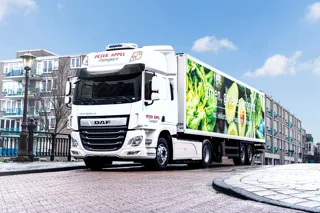Paccar, the parent company of Daf Trucks, is to extend the global shutdown of its truck and engine production facilities until April 20 due to the impact of the coronavirus.
The original closure, which includes Daf’s Leyland factory in Lancashire, was due to end on April 6.
The company will review future actions on a regular basis and doesn’t rule out further extending the lockdown period.
Speaking to Commercial Fleet, Daf Trucks managing director Laurence Drake (pictured above) said the business was adjusting rapidly to ensure it was able to continue supporting dealers and customers, particularly for aftersales and recovery services.
“Within the first two weeks of shutdown, with our pipeline orders it was business as usual, but last week into this week, the number of service jobs has reduced by 25%,” Drake said. “And our parts out has fallen by 20%.”
Daf’s independent dealer network of 134 sites has seen a 14% drop in mechanics, although it continues to have sufficient capacity to cope with ongoing repair and maintenance (R&M) jobs.
“We expect further decline (in mechanics), but as long as we stay ahead of the (R&M) curve, there will be no problem,” Drake added.
Parts availability remains high – first time pick rates are at 95%, down from the usual 99% – as Daf had taken measures to increase stock levels during the Brexit uncertainty.
Although parts suppliers for all truck manufacturers are also in lockdown, Drake is confident he has sufficient stock for a few more weeks based on normal purchasing patterns, but possibly as much as five weeks with reduced demand.
Daf has taken further action to support its customers, offering them the opportunity to freeze R&M contracts for two months or take a payment holiday for two months. Around 1,100 vehicles are now on a frozen contract.
“We will be pragmatic with this; it’s two months now but it may be longer,” Drake said. “The payment holiday would give them two months’ credit back but that’s not as popular. And, of course, it depends on the business – supermarkets are super busy and want more vehicles.”
Paccar Financial, Daf's in-house funding business, is also having discussions with fleets about payment contracts, with various options available depending on the type and length of finance.
Drake, appointed managing director in September, was previously sales director - the activity most affected by the coronavirus pandemic.
Demand is around 20% of normal levels, he said, and mainly from the likes of the supermarkets, although even that is starting to peter out.
The priority for Daf now is to ensure it is ready to begin fulfilling orders post lockdown, working with its network of 52 bodybuilders push vehicles through the chain.
In a statement, Paccar said its financial results for 2020 would be impacted by lower production schedules due to changes in customer demand and the impact of government regulations or mandates. The company will provide a business update and first quarter results on April 21, 2020.
However, it remains in a strong financial position to ride out the coronavirus storm, with manufacturing cash and marketable securities at $4.3billion (£3.5bn) at the end of March 2020. It also has access to existing lines of credit of $3billion (£2.4bn).
** An extended interview with Laurence Drake will be pushed in the May edition of Fleet News, which will be available as digital only e-zine on May 28.























Login to comment
Comments
No comments have been made yet.